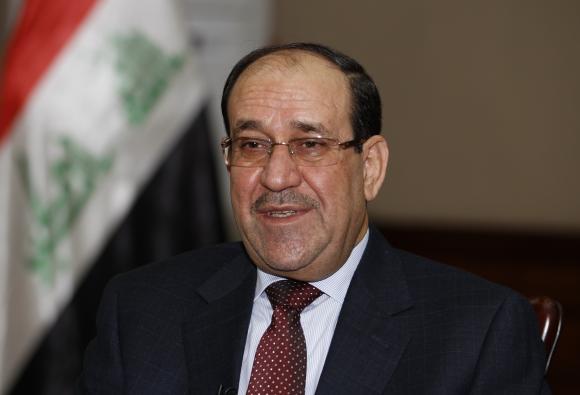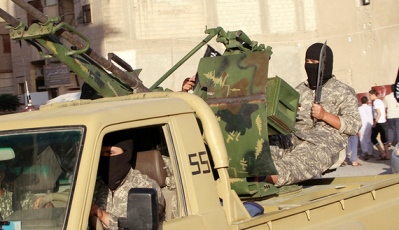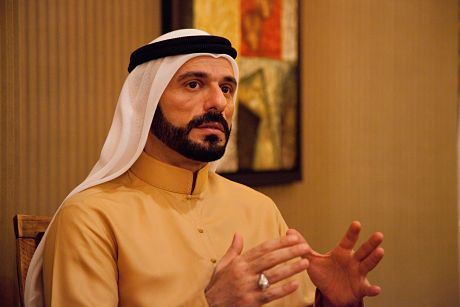Analysis: What next for Gaza?
by Robert Turner on 16-07-2014
As I sit here in my office cum bedroom in Gaza City, listening to the airstrikes and rocket fire, there is talk of how to bring the violence to an end. This is to be eminently desired, particularly for the civilian population in Gaza who have suffered the brunt of this escalation.

A Palestinian man collects belongings as he inspects a house after it was destroyed by an Israeli air strike early on July 16, 2014, in Gaza City.(AFP/Mohamed Abed)
 If this prospective cease-fire ends the same way as those before it, would they think this is anything other than a brief respite from violence?
If this prospective cease-fire ends the same way as those before it, would they think this is anything other than a brief respite from violence?For Gaza, a return to 'calm' is a return to the eighth year of blockade. It is a return to over 50 percent of the population either unemployed or unpaid. It is a return to confinement to Gaza and no external access to markets, employment, or education -- in short, no access to the outside world.
For example, if one of the grandmothers I spoke to yesterday should wish to go to Birzeit University in the West Bank to study, she cannot.
The Israeli government need not demonstrate this grandmother poses any specific threat to security as they have approved a blanket ban on Gazans studying in the West Bank based on an undefined security threat. The vast majority of the population are prevented from leaving this 365 square kilometer sliver of land.
If one of the tomato farmers I met yesterday can find a buyer for his product in Paris, Peoria or Prague under certain conditions he can box up his tomatoes, ship them through the one open commercial crossing and on to Ashdod port or Ben Gurion airport -- two of the most sensitive security sites in Israel.
Unfortunately there is no market for Gazan tomatoes in Paris, Peoria or Prague. There is a market for Gazan tomatoes in Israel and the West Bank, but this farmer is not allowed to sell his tomatoes there because of that same undefined security threat.
The elderly I met yesterday wonder how they will access health care after this cease-fire. Other than the services provided by us at the United Nations Relief and Works Agency and some private and NGO facilities, the government health care system is collapsing. Infrastructure has been damaged and the people wonder who will take responsibility to fix it.
If the Palestinian Authority is not permitted or is unable to do that is the international community expected to? Or will Israel, the occupying power, assume that responsibility?
The mothers I met yesterday wonder where their children will go to school in six short weeks if not in one of UNRWA's 245 schools. Who will repair the government schools, deliver the textbooks, pay the teachers? If government schools do not open will UNRWA be expected to fill that void?
We lack the physical capacity, human and financial resources to accept tens, or even hundreds, of thousands of additional students in our schools.
UNRWA and the UN family, including WFP, UNICEF, OCHA and UNDP, remain engaged in meeting the humanitarian needs of the people of Gaza. Amongst the areas in which UNRWA has scaled up its work in recent years is construction, where we have a very large portfolio.
This is predominantly schools for our education program, in which we taught over 230,000 children last year, and houses for those whose homes were destroyed in previous conflicts or demolished by Israel.
If we want to build something we have to submit a detailed project proposal to Israel with the design, location and a complete bill of quantities. The Israelis then review the proposal, a process that is supposed to take not more than two months but on average takes nearly 20 months.
We received no project approvals between March 2013 and May 2014, during the last 'calm,' despite having nearly USD 100 million worth of projects awaiting approval. Will this 'calm' be any better?
More importantly, the people here wonder who will govern Gaza? No one has an answer to that question. I think the people of Gaza would say that if this is the form of 'calm' people have in mind, while preferable to the current violence, it cannot last. It will not last.
Robert Turner is Gaza Director of Operations for UNRWA.
The views expressed in this article are the author's and do not necessarily reflect Ma'an News Agency's editorial policy.












